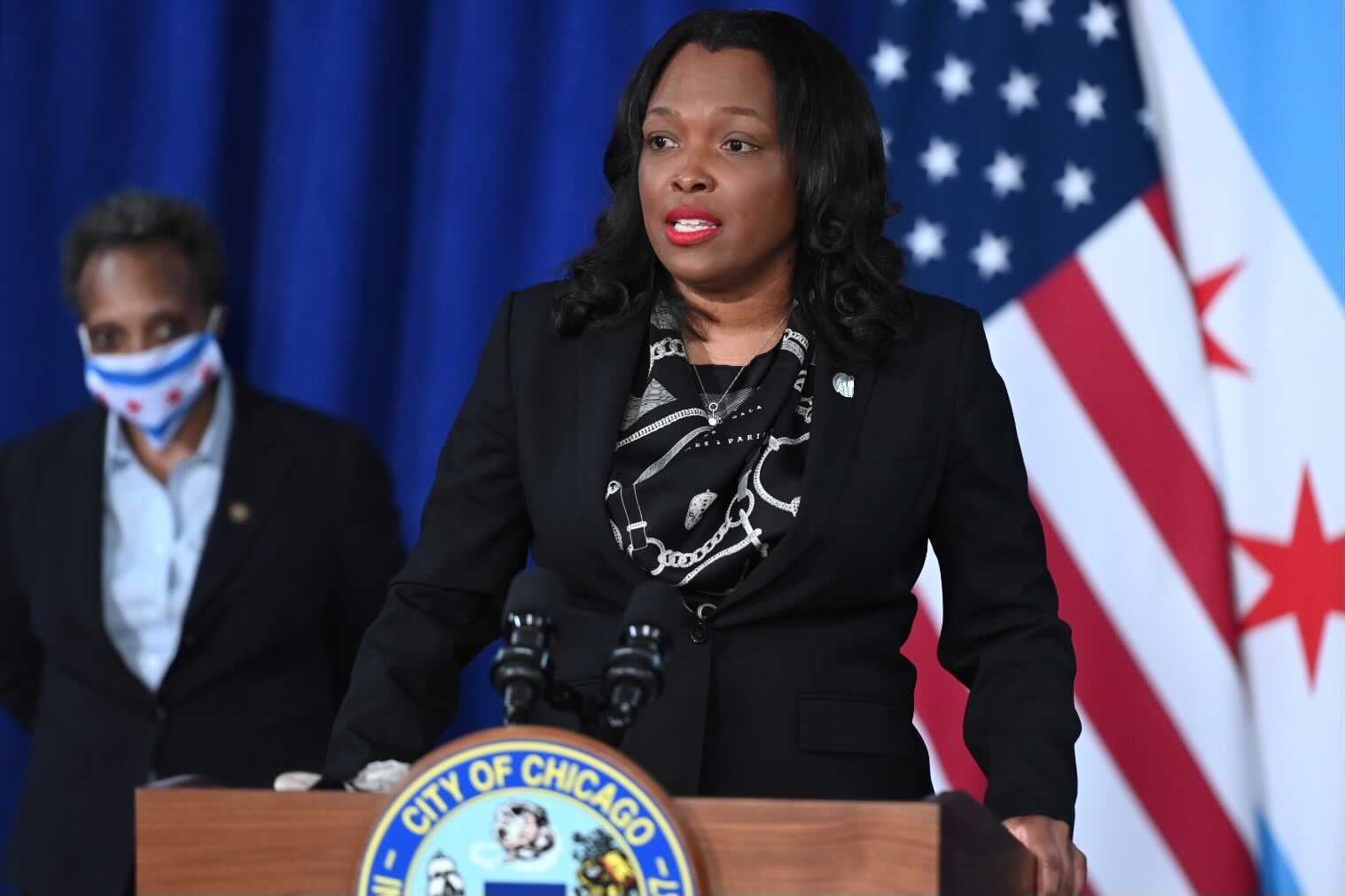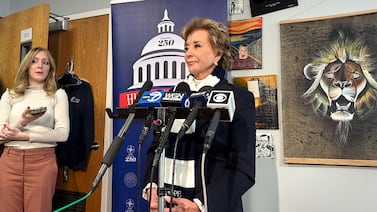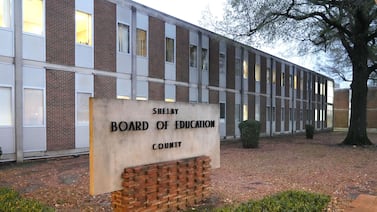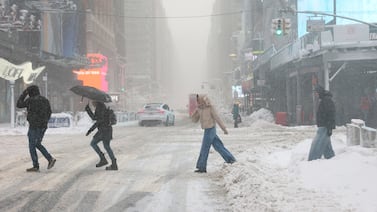News that Chicago schools chief Janice Jackson planned to step down from her position at a critical juncture surprised some Chicago education insiders Monday and worried parents and teachers who wondered what’s next for the nation’s third largest school district.
Several praised Jackson’s steadfast commitment to doing better for Chicago students as they ticked off the challenges that marked her tenure and would likely affect those of any future leader: fully reopening schools, figuring out how to support students academically and emotionally in a pandemic, deciding how to spend billions in federal relief money, and winning back students and parents after a steep decline in enrollment.
And she isn’t the only leadership member leaving: Chief Operating Officer Arnie Rivera will also be leaving the district, school officials confirmed Monday. That announcement comes only five weeks after Chicago schools’ No. 2, LaTanya McDade, announced she would be leaving Chicago to lead Virginia’s second largest school district. (The district said in a Monday evening letter to families that it will host a virtual townhall about the forthcoming leadership changes and summer and fall planning on Thursday at 6 p.m.)
Education leaders across the city acknowledged how Jackson’s background as a parent and former Chicago student, teacher, and principal helped her set goals with the achievement of Black and Latino students at the core. Speaking at a press conference on Monday after Jackson formally announced her decision to not renew her contract that ends June 30, Miguel del Valle, president of the city’s school board, said Jackson’s involvement in the public school district at every level made her uniquely qualified for the role.
“She’s one of the strongest leaders I have ever met — not just in education but across the board,” said del Valle.
Femi Skanes, the principal at Morgan Park High School, said that despite the year’s challenges, Jackson had left the district “in a sound place” and that she hoped the next CEO would share the five-year vision Jackson made public in 2019. That vision established an office of equity and set ambitious academic benchmarks, including graduation rate and test score increases, for students.
“She’s been a tremendous leader,” said Skanes, who previously served as principal at Al Raby High School, which Jackson, who is now in her 40s, established as a 27-year-old teacher during a period when Chicago was rapidly opening new schools. “My initial reaction is of course some sadness, but also excitement, because according to her announcement, she will still be engaged in education advocacy.”
Skanes said she recognized that Monday’s announcement would spur anxiety and concern as part of a larger wave of district departures, but she said transition was happening throughout education. Several superintendents of large school systems have resigned or retired in recent weeks. “As difficult as it is, we have to continue to stay laser focused on the goals we have set for our own schools. The good work we’re doing in our schools everyday has to continue.”
Liz Dozier, a former Chicago principal and founder of the nonprofit organization Chicago Beyond, also felt that Jackson had set the district on the right path. Dozier’s organization invests in projects that involve city youth, and she believes Jackson’s policies were improving conditions for students. “Everything from gains in student achievement to the expansion of more academic programming across the city — we need to continue on the path and the precedent that she set,” Dozier said.
Hancock High School English teacher Ray Salazar said he was disappointed to hear the news.
“Already our district, our city, our world are in a precarious situation as we start finding our way out of the pandemic,” Salazar said. “We are going to have a major change that puts in a state of opportunity, or crisis. I’m not sure which.”
Some critics of Chicago Public Schools seized upon the announcement of the departure of three top district officials to call for a change of culture.
Troy LaRaviere, a former principal who now runs the Chicago Principals & Administrators Association, said Jackson’s administration, like those before her, made too many decisions with too little input from principals, families, and students.
“No matter who becomes the next CEO, we won’t have any stability until we end this misguided approach to management and get meaningful ongoing input from principals and other key stakeholders when creating district plans and policies,” said LaRaviere.
Natasha Carlsen, a special education teacher at Marvin Camras Children’s Engineering Elementary School, said she had appreciated Jackson’s leadership, but was hopeful that a new chief would address gaps in special education services more adeptly. “It’s a flawed system that CPS is running,” said Carlsen.
That sentiment was shared by Christine Palmieri, a parent of a child on the autism spectrum, who said she hoped new leadership would prioritize better treatment of children with disabilities.
“Our kids are really suffering within CPS,” she said. “They need so much more — and we just don’t see the leadership seeming to care.”
Bobby Price, a Chicago parent who owns Principle Barbers in North Lawndale, wasn’t sure how to feel as he lamented another change up top — this is the sixth in a decade, though Jackson’s tenure was the longest at three-and-a-half years. His wife is a chemistry teacher who works in Chicago schools and together they have two students, a kindergartner and a second grader, enrolled at Suder Montessori School.
“We got what, six weeks before school ends,” Price asked. “It’s been tough,” he said, and the district had made it challenging for teachers and parents alike.
When his children were still remote learning and when his wife was working from her school building, Price would shuffle between logging a child into a Zoom class, running to his barbershop to cut hair, then running back home to teach his kids — again.
“Mercy on single parents. God help them,” said Price, who said he felt Jackson’s administration was insensitive to the needs of both educators and families during the pandemic. “I have a wife who’s a teacher, both parents at home married. What are other parents doing? God help them. I can’t even imagine.”
Allison Kaplan, a parent in Roscoe Village, also worried about stability in a year that has felt anything but.
“It doesn’t feel great as a parent to know that not only is the beginning of next year going to be chaotic just based on the circumstances of our situation … now there’s an added chaotic element of not only one leadership person stepping away, but three total,” she said. “It’s hard to feel stable.”
In January, Kaplan and her husband withdrew their kindergartner from John James Audubon Elementary School and enrolled him at a neighborhood daycare that offered care to kindergarten-aged children. Both parents needed to continue working full time — an impossibility with daily remote learning, Kaplan said.
At a time when she and her husband crave stability from CPS leadership, Monday’s shake up left them thinking about “greener pastures.” They don’t want to move to the suburbs, but they’re growing increasingly tired of Chicago’s educational upheaval.
“I believe in public education and I want my child to go to their neighborhood school. But can my family function if there’s chaos?” Kaplan said. “If people are going to be able to go back to work full time, there has to be a stable school structure in place. As it is now … it’s not possible for the economy to come roaring back at full speed. That falls disproportionately on mothers.”







